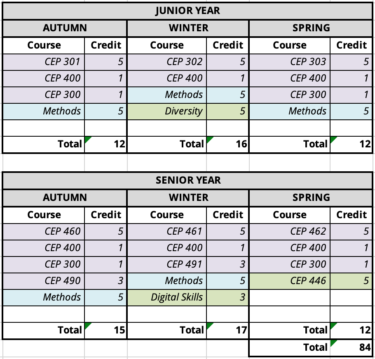Community, Environment, and Planning (CEP) is a two-year undergraduate major in the Department of Urban Design and Planning, in the College of Built Environments.
Students begin their time in CEP by crafting an Individualized Study Plan (ISP). This is a document written by the student to highlight their learning goals and plan out their course choices and extracurricular activities. Through the ISP students develop a focus where they weave tie the various components of their education to a common theme. These components may include their classes, internship, clubs, volunteer opportunities, senior project, study abroad experience, and more.
Each quarter, CEP students take one 5-credit core course. These courses are: CEP 301, 302, 303, 460, 461, and 462. In addition, CEP students take a 1-credit CEP 400: Governance course each quarter, as well as a 1-credit CEP 300: Retreat course in Autumn and Spring. In addition, students take at least 25-credits of Methods courses, which are +300-level courses that students choose for themselves.
Students must take the 5-credit CEP 446: Internship course in any quarter of their choosing. They also must complete at least one 5-credit Diversity (DIV) course, and at least one 3-credit Digital Skills course. In their final year, CEP students complete a nine-month independent Senior Project. We offer two 3-credit courses, CEP 490 and CEP 491, to support this process.
In the final quarter of CEP, students craft an online portfolio to document their educational journey and learning experiences. This portfolio is displayed as a website to showcase students’ unique skills, projects, and experiences.
In total, CEP is an 80-credit major, with 50 credits required within the CEP program, and 30 credits from elsewhere on campus. To learn more about CEP’s structure, please read our policy guidebook, the Plumb Manual.
Example Course Schedule:
